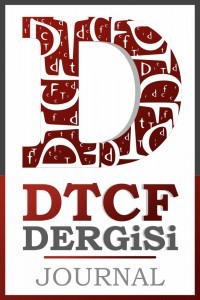ORTAÇAĞ HRİSTIYAN DÜNYASINDA BELLEK KAVRAMI VE GİZEM OYUNLARI: YORK DÖNGÜSÜ
Ortaçağ, Tiyatro, Ortaçağ Felsefesi, Ortaçağ Tiyatrosu, İngiliz Tiyatrosu, Bellek
THE CONCEPT OF MEMORY IN MEDIEVAL CHRISTIAN THOUGHT AND MYSTERY PLAYS: THE YORK CYCLE
Middle Ages, Drama, Medieval Philosophy, Medieval Drama, British Drama, Memory,
___
- Aquinas, Thomas. “Commentary on Aristotle, On Memory ve Recollection”. Çev. John Burchill. The Medieval Craft of Memory: An Anthology of Texts and Pictures. Ed. Mary J. Carruthers, ve Jan M. Ziolkowski. Philadelphia: University of Pennsylvania Press, 2002.
- Beadle, Richard ve Pamela M. King. York Mystery Plays: A Selection in Modern Spelling. New York: Oxford University Press, 2009.
- Benton, Janetta Rebold. Materials, Methods, and Masterpieces of Medieval Art. Santa Barbara, California: Praeger, 2009.
- Brockett, Oscar G. Tiyatro Tarihi. Çev. Sevinç Sokullu, ve ark. İstanbul: Dost, 2000.
- “Cardinal Virtues.” The Catholic Encyclopedia, c. 3, New York: The Encyclopedia Press, 1913.
- Carruthers, Mary J. The Book of Memory: A Study of Memory in Medieval Culture. Cambridge, UK; ve New York: Cambridge University Press, 1990.
- Boncompagno da Signa. “On Memory”. Çev. Sean Gallagher. The Medieval Craft of Memory: An Anthology of Texts and Pictures. Ed. Mary J. Carruthers, ve Jan M. Ziolkowski. Philadelphia: University of Pennsylvania Press, 2002.
- Fischer-Lichte, Erika. History of European Drama and Theatre. London: Routledge, 2002.
- Gilson, Etienne. Ortaçağ Felsefesinin Ruhu. Çev. Şamil Öçal. İstanbul: Açılım, 2005.
- Rogerson, Margaret. Playing a Part in History: The York Mysteries, 1951–2006. Toronto: University of Toronto Press, 2009.
- "Scriptural play." The Reader’s Encyclopedia of World Drama. New York: Thomas Y. Crowell Company, 1969.
- Staines, David. “The English mystery cycles.” The Theatre of Medieval Europe. Ed. Eckehard Simon. New York: Cambridge University Press, 1991.
- Strayer, Joseph Reese, ed. Dictionary of the Middle Ages, c. 8, New York: Charles Scribner’s Sons, 1987.
- “Trop.” Gösterim Sanatları Terimleri Sözlüğü. Ankara: Türk Dil Kurumu Yayınları, 1983.
- “Trope.” Encyclopædia Britannica, Encyclopædia Britannica, inc., 1 Mayıs 2018.
- Yates, Frances A. The Art of Memory. New York: Routledge, 1999.
- Yayın Aralığı: Yılda 2 Sayı
- Başlangıç: 1942
- Yayıncı: Ankara Üniversitesi
GIUSEPPE PARINI'NİN IL GIORNO ADLI YAPITINDA YER ALAN TOPLUMSAL VE AHLÂKİ ÖGELER
FOTOĞRAFLARDAN VE YÜZ ÜZERİNDEN ALINAN ANTROPOMETRİK ÖLÇÜLERDEN KİMLİK TESPİTİ VE CİNSİYET TAYİNİ
LEVIATHAN'IN HAYALETLERİ: SCHMITT VE NEUMANN'DA HUKUK VE DEVLET
TÜRKİYE'DE YAPILAN HOMOFOBİ ÇALIŞMALARINA GENEL BİR BAKIŞ
İrem METİN ORTA, Selin Metin CAMGÖZ
UYARICI-TEPKİ İZLERLİĞİ BULUNDUĞUNDA BAĞLAM TEKRARI SIRALI UYUMLULUK ETKİSİNİ DEĞİŞTİRMEZ
Aslı Bahar İNAN, Nart Bedin ATALAY, Mine MISIRLISOY
ORTAÇAĞ HRİSTIYAN DÜNYASINDA BELLEK KAVRAMI VE GİZEM OYUNLARI: YORK DÖNGÜSÜ
ÜNİVERSİTE ÖĞRENCİLERİNDE DİJİTAL / E-KİTAP OKUMA KÜLTÜRÜ: SELÇUK ÜNİVERSİTESİ ÖRNEĞİ
Hüseyin ODABAŞ, Zuhal Yonca ODABAŞ, Hasan SEVMEZ
FİLATELİK MATERYALİN NİTELENMESİ
OPERADA CİNAYET: “CAVALLERIA RUSTICANA” ve “I PAGLIACCI”
ARDAHAN'IN ÇILDIR İLÇESİNDEKİ SUHARA KÖYÜ CAMİİ'NE AİT ARŞİV BELGELERİ
